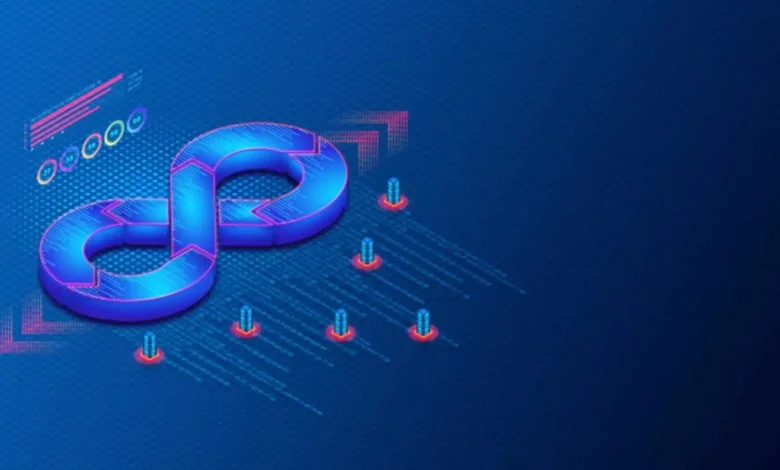DevOps means [Development and Operations]. It is software development combined with an IT operations automation process. Devops is a set of practices, tools, and a cultural philosophy that aims to make some products using the automated process of software and hardware. Its goal is to improve the collaboration between the development and operation teams for faster and more efficient software delivery.
The Key Concepts of Devops are

Collaboration: collaborating with the development team and operations team to improve the productivity of the products.
Automation: Automating tasks using the latest tools and making the development, testing, and deployment tasks more efficient and accurate.
Continuous integration/continuous delivery (CI/CD): Automating the integration of code change, which is meant for continuous integration, and deploying the code to the production environment is meant for continuous delivery.
Monitoring: Ensuring systems are reliable and issues are identified and corrected accurately.
How Do Devops Work?
Devops works by integrating people, processes, and tools to improve the software delivery. In this process there are several tasks, such as plan, develop, build, test, release, and monitor. Combining all the steps, the devops team works.
Plan:
In this process the architecture of the project is planned and discussed between the development and the operation team. A proper roadmap is created using tools such as JIRA or trello. By using the roadmap of the project, each team member should contribute to the project and complete the task according to the deadlines.
Develop:
In this step, the developers write the code in small increments and store it in version control systems, such as Git. Each developer has a task to develop the code, and everyone stores their code in the version control systems. Then their code is analyzed and reviewed by the senior development team. This code is frequently tested by the testing team to make the code more accurate and efficient.
Build:
In the build phase the code changes and corrections are automatically integrated into a shared repository using the CI tools Like Jenkins, GitLab CI, or CircleCI.
The builds are automatically created, ensuring compatibility and eliminating integration issues.
Test:
This phase of testing consists of a team called the testing team, which ensures the code functionality and performance using automated tools and testers. Some of the tools, like selenium, Junit or TestNG, are often used.
Release:
The code, which is tested in snow, is deployed to production environments using tools like ansible , kubernetes and docker.The continuous delivery ensures every change is ready to deploy.
By using all the above processes, the devops team works and enhances their products.
Monitor:
Systems are monitored in this phase, where the performance and reliability of the product are tested and integrated using tools like Nagios, Prometheus, or Grafana. To identify the issues, alerts and logs are used.
Why is Devops an Important Field?
Devops is a crucial field because it is used to address the challenges of modern software development combined with its operations, which makes the software more reliable and productive. The devops is not just a methodology; it’s a transformative approach that combines technology, processes, and culture to drive innovation and technology in the success of business. It majorly develops the process of development and enhances the reliability of the product; it also reduces the making cost of the products and helps the organizations aiming to survive in a competitive, digitally growing world.
Important Question for Devops Interview
General concepts:
- How would you define the word devops?
- What makes it important in the software field?
- What are the principles of devops and its practices?
- Compare and contrast agile methodology and devops?
- What are CD and CI in the view of Devops?
- How does devops stand in terms of development workflows?
Tools and Technologies:
- Describe the purpose of configuration management tools and list some examples.
- How is Git utilized within DevOps practices?
- How would you automate a task that is traditionally manual in a DevOps workflow?
- What is the significance of monitoring and logging in a DevOps setup?
- Explain the function of a reverse proxy in a DevOps architecture.
- What are blue-green deployments, and how do they compare to canary releases?
Technical Knowledge:
- Differentiate between virtual machines and containers.
- How does Kubernetes handle the scaling of applications and load distribution?
- What is microservices architecture, and how does DevOps complement it?
- Discuss various branching and merging strategies used in Git workflows.
Real-World Scenarios:
- Share an example of a challenging DevOps issue you encountered and how you resolved it.
- What steps would you take to manage a failed deployment?
- How would you approach breaking down a monolithic application into microservices?
Collaboration and Culture:
- What strategies would you employ to foster collaboration between developers and operations teams?
- What obstacles do organizations face when implementing DevOps, and how can they be overcome?
- How would you introduce DevOps concepts and tools into a company that is new to the practice?
Must Read: Latest Python Interview Questions




